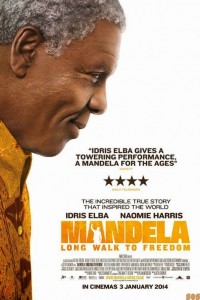 Early in his life, South Africa’s Nelson Mandela spoke hard truths to the white European government that was oppressing his people. Many years later, he had to do the same thing to his fellow Africans in order to guide them toward establishing a nation grounded in healing and forgiveness.
Early in his life, South Africa’s Nelson Mandela spoke hard truths to the white European government that was oppressing his people. Many years later, he had to do the same thing to his fellow Africans in order to guide them toward establishing a nation grounded in healing and forgiveness.
The new feature film “Mandela: Long Walk to Freedom,” based on the former South African President’s autobiography, shares that entire dramatic and difficult journey.
Though black people are the majority in South Africa, they are subject to violence and suppression from their white government. Mandela and his friends in the African National Congress (ANC) do their best to peacefully end the country’s unjust laws through political means, but when years pass with the oppression only getting worse – with women and children being shot in the back for protesting for their rights – the freedom fighters decide to take up violent means to achieve their ends. Mandela says, “We no longer accept the authority of a state that makes war on its own people.”
This only makes the white supremacist government come after them more aggressively, resulting in Mandela and his ANC associates being locked up on Robben Island for 27 years.
Actor Idris Elba brings charisma and gravitas to the role of Mandela, making it easy to understand why so many people looked to him as their leader. His defiant words rouse Africans to action: “When we are in prison, let them mine their own gold, clean their own houses, and wash their own clothes.”
At the same time, director Justin Chadwick and screenwriter William Nicholson make sure this isn’t a complete hagiography. Early in the film, Mandela’s first marriage breaks up because of his affairs with other women, showing he’s not completely immune from a little fame and power going to his head. However, it becomes clear that Mandela can never love any woman more than he loves the cause for freedom.
The reason he eventually connects with and marries Winnie (Naomie Harris) is because they share a passion to end apartheid. At the time, however, they’re unaware of the toll this battle will take on them as individuals and a couple. And maybe that’s the price true reformers have to pay. They sacrifice the ordinary personal joys of life to achieve some greater good.
Despite using violence to fight apartheid, Mandela never loses his moral foundation. Though he’s accused by white society of trying to establish black domination, he answers, “I have fought against white domination. I have fought against black domination. I have cherished the ideal of a democratic and free society in which all persons live together in harmony and with equal opportunities.”
Those ideals are tested when Mandela and his compatriots are sentenced to life in prison on Robben Island for their crimes against the government. Their captors never miss an opportunity to make sure these prisoners are demeaned and abused, leading Mandela to ask if they are part of a justice system or a band of gangsters.
Mandela somehow manages not to let hatred overwhelm him. The same, however, can’t be said for Winnie. In addition to witnessing government-sanctioned murders of her fellow Africans, she is personally subject to all kinds of abuse, torture and imprisonment that leaves its scars on her soul. She claims it’s her hate that makes her strong. This is one area that drives a real wedge between Nelson and Winnie.
When the situation in South Africa finally starts turning and the new white President, F.W. de Klerk, strives to work with Nelson to establish equality for black people, Winnie resists any sort of accommodation or compromise that would result in peaceful coexistence. She simply wants revenge. Nelson says, “I admit I want revenge, but I want something more. I want to live without fear and hatred.”
And when many black Africans who feel the same as Winnie start taking up arms to seek vengeance against their former white oppressors, Mandela goes on television to flat out tell them they’re wrong. He says they must practice forgiveness if they want to move forward. Mandela is speaking a hard truth, and he’s likely the only voice in the country who had earned enough respect to have people listen to his call for peace.
And this wasn’t just a platitude he preached in public. In a scene in which his grandchildren are making fun of white people, Mandela lovingly admonishes them, “That is what they do to us. We must do better.”
Though some biopics can feel disjointed because there’s so much story to squeeze into a short amount of time, “Mandela: Long Walk to Freedom” felt surprisingly fluid. It covers about 50 years, but Elba’s performance is the through line that holds it all together.
If you’re looking to see a captivating piece of history about a true hero, “Mandela: Long Walk to Freedom” is the movie for you.











